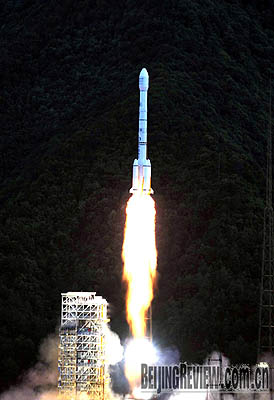|

INTO THE NIGHT: A Long March-3B rocket carrying Zhongxing 9 satellite blasts off from the launch pad at the Xichang Satellite Launch Center, in southwest China's Sichuan Province, on June 9
China launched a new communications satellite, Zhongxing 9, from the Xichang Satellite Launch Center in southwestern Sichuan Province at 8:15 p.m. (Beijing Time) on June 9.
The satellite was projected into space aboard a Long March-3B rocket carrier. It was the 107th launch mission of Long March rockets.
Zhongxing 9, ordered by the China Satellite Communications Corp. from France-based Thales Alenia Space at the price of 100 million euros, weighs 4.5 tons and is expected to be in service for 15 years. It will be used for live television broadcasts.
Audiences will be able to watch live broadcasts of Olympic competitions via the satellite that will become operational before the Beijing Olympic Games in August. The quality and coverage of the country's television and broadcasting services will be remarkably improved and people in remote regions of China will receive clear television programs.
The China Great Wall Industrial Corp., the contractor of the satellite launch, signed a launch service contract with the China Satellite Communications Corp. in November 2005.
As the only Chinese company engaged in international commercial satellite launching services, the China Great Wall Industrial Corp. has successfully sent 34 foreign satellites into orbit.
China's mature and safe rocket technology has gained increasing recognition of Western companies. In late April, French Eutelsat Communications Group SA, the second largest satellite operator in Europe, purchased precedent-setting insurance enabling it to use Chinese rockets for future launches.
Covering as many as nine satellites, the insurance package is the first one of its kind since the 1990s when China began to contract the launch of large telecommunications satellites of major Western operators.
Eutelsat said it has merely put in place an option for a single satellite launch by China in the 2010 time frame, but industry officials said the company's long-term satellite-construction and insurance plans suggest that Eutelsat is committed to eventual broader use of China's carrier rockets. | 